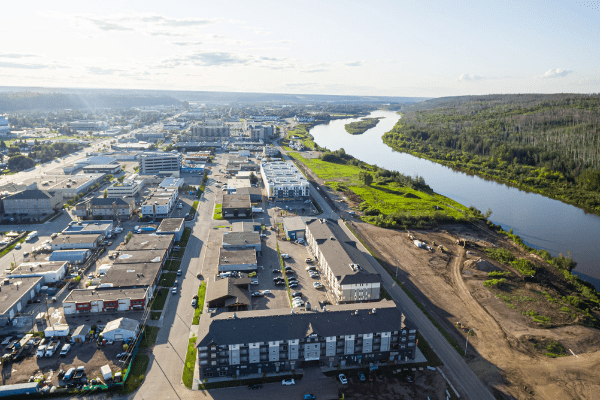Welcome to a comprehensive guide on living in Fort McMurray, where we’ll provide you with everything you need to know. Fort McMurray is located in the heart of Alberta, Canada, is a vibrant and unique community known for its ties to the oil and gas industry. In this article, we’ll cover its
Fact File of Fort McMurray
- Population in 2016: 61,374
- Average high temperatures in July: 21°C
- Average high temperatures in January: -18°C
- Number of rainy days (0.2mm or more) per year: 77
- Key industries: Oil and gas, forestry, tourism
- Average residential property price (July – September 2017): $472,000
- Time zone: MST (UTC -7 hours)
- Official Regional Municipality of Wood Buffalo website: rmwb.ca
Where is Fort McMurray?
Fort McMurray is located in the northeastern part of the Canadian province of Alberta. It is situated in the Regional Municipality of Wood Buffalo, along the banks of the Athabasca River. The city is well-known for its proximity to the Athabasca Oil Sands, a significant source of oil production in Canada.
Living in Fort McMurray: Economy
Living in Fort McMurray provides access to a unique and resource-rich economy. The city’s economic landscape is primarily shaped by the oil and gas industry, with a strong emphasis on the extraction of bitumen from the nearby Athabasca Oil Sands. This industry has led to significant employment opportunities in the region, attracting workers from various parts of Canada and around the world.
However, the economy of Fort McMurray is closely tied to the global energy market. As such, it can experience fluctuations in response to shifts in oil prices. This dynamic nature of the local economy can impact both job availability and the cost of living in the region.
Living in Fort McMurray: Camp life
Living in Fort McMurray often involves experiences with camp life. Camps are temporary housing facilities commonly used in resource-based industries such as oil, gas, and mining. These camps are designed to accommodate workers who are employed in remote or rural areas, including the vast landscapes of northern Alberta.
Camp life in Fort McMurray serves several essential functions. First and foremost, it provides housing for the workforce. Many individuals who work in the oil and gas sector, as well as related industries, reside in these camps during their shifts. They offer basic amenities like sleeping quarters, dining facilities, and common areas for relaxation and socializing.
One notable aspect of camp life is the rotational work schedule. Many employees work on a “fly-in, fly-out” basis, spending a specified period in the camp and then returning to their homes during time off. This schedule can be challenging for workers and their families, as it often involves extended periods away from home.
Camp life fosters a strong sense of community among residents. The shared living spaces, dining areas, and recreational facilities create opportunities for social interaction. Residents often form close bonds with their fellow workers, as they share the challenges and experiences of life in a remote camp.
While camp life can be financially rewarding due to the high demand for workers in the region, it also comes with its unique set of challenges. Workers need to adapt to the isolated environment, manage time away from family and friends, and adhere to strict schedules. Additionally, the living conditions in camps, although functional, may not provide the same level of comfort as a traditional home.
Living in Fort McMurray: Weather
Living in Fort McMurray means experiencing a diverse range of weather conditions throughout the year. The climate in this northern Alberta city is classified as subarctic, and here’s what you can expect:
Winters (December to February) in Fort McMurray are long and cold, with temperatures often dropping below freezing. Average high temperatures in January are around -18°C. Snowfall is common, and the region is known for its winter sports opportunities.
Spring, which spans from March to May, is a transition period in Fort McMurray, with temperatures gradually warming up. However, it can still be chilly, and snow may linger into April. As the season progresses, you’ll witness the emergence of greenery and blossoming flowers.
Summers (June to August) in Fort McMurray are relatively short but warm. Average high temperatures in July are around 21°C, making it an ideal time for outdoor activities. The long daylight hours are perfect for exploring the beautiful natural surroundings.
Autumn, from September to November, is a picturesque time in Fort McMurray when the foliage transforms into vibrant shades of red, orange, and yellow. The weather gradually cools, and it’s an excellent time for hiking and outdoor adventures.
Fort McMurray experiences snowfall from October to May, covering the region in a winter wonderland. Residents often engage in winter sports like skiing, snowmobiling, and ice fishing.
READ ALSO: Moving to Edmonton: Everything You Need To Know
Living In Fort McMurray – Driving & Public Transit
Driving is a common mode of transportation for residents in Fort McMurray. The city has a network of well-maintained roads and highways that connect various neighborhoods and provide access to nearby natural attractions. While driving offers flexibility and convenience, it’s essential to adapt to the changing weather conditions, especially in the winter, when snow and ice can impact road safety. Residents typically use personal vehicles for their daily commutes and errands.
Public transit is also available in Fort McMurray, primarily operated by Wood Buffalo Transit. The transit system provides bus services within the city, making it a viable option for those who prefer not to drive or for commuting to work. Wood Buffalo Transit offers routes that cover a substantial part of the city, and schedules are designed to accommodate various time frames, including early morning and evening services.
For residents who work in the oil sands or other industries outside the city, many employers provide transportation from Fort McMurray to the work camps. This arrangement minimizes the need for personal vehicles during work shifts and promotes carpooling, which is environmentally friendly and cost-effective.
Living In Fort McMurray – Education System
Fort McMurray boasts a robust education system that caters to students of all ages. The city is home to 24 elementary and secondary schools, offering a diverse range of educational opportunities for local youth. Additionally, there are six schools located in the rural areas of Wood Buffalo, extending access to quality education beyond the city’s limits.
These elementary and secondary schools are part of the local school districts and provide a comprehensive curriculum to students, helping them develop academically, socially, and culturally. The presence of these institutions ensures that families living in Fort McMurray have access to a well-rounded education for their children.
Moreover, for those pursuing higher education, Fort McMurray offers post-secondary options. Students can further their studies in a range of fields, including vocational and academic programs. This availability of post-secondary education contributes to the city’s workforce diversity and professional growth opportunities.
Living In Fort McMurray – Medical Care
Fort McMurray offers residents access to comprehensive medical care and healthcare facilities. The city’s healthcare system is designed to meet the needs of its growing population, providing a range of services and specialized care.
The Northern Lights Regional Health Centre is the primary medical facility in Fort McMurray. This modern hospital offers a wide array of medical services, including emergency care, surgery, maternity services, and diagnostic imaging. The hospital is staffed with skilled healthcare professionals who are dedicated to providing quality care to the community.
Also, Fort McMurray has several medical clinics and healthcare centers throughout the city, ensuring that residents have access to family physicians, specialists, and preventive care services. These facilities offer a wide range of medical treatments, from routine check-ups to the management of chronic conditions.
Living In Fort McMurray – Things to Do in Fort McMurray
Fort McMurray offers a diverse array of activities and attractions that cater to a wide range of interests, making it an exciting place to explore and live.
Outdoor enthusiasts can take advantage of the city’s stunning natural surroundings. You can embark on hiking adventures along the picturesque Birchwood Trails, enjoy kayaking or fishing on the scenic Athabasca River, or revel in the lush green spaces found in local parks like MacDonald Island Park.
Winters in Fort McMurray provide an opportunity for thrilling winter sports. You can hit the slopes for skiing and snowboarding at Vista Ridge All Seasons Park or venture into the snowy wilderness for snowmobiling adventures.
Enjoy the city’s rich history and cultural heritage by visiting Heritage Park, where you can learn about the Athabasca Oil Sands and take a tour of the oil sands discovery center. For those interested in the arts, the Keyano Theatre and Arts Centre is a hub for live performances and art exhibitions.
Golf enthusiasts can tee off at the breathtaking Miskanaw Golf Club, surrounded by scenic vistas and natural beauty. Fort McMurray’s culinary scene is equally impressive, offering a variety of dining experiences from local cuisine to international flavors.
The city also hosts numerous community events and festivals, providing a platform for showcasing its vibrant culture and heritage. Families can enjoy quality time at the Syncrude Athletic Park, a welcoming space for kids to play and families to connect.
For those who love angling, the Athabasca River is a popular fishing spot where you can cast your line and reel in your catch. Fort McMurray also offers the chance for day trips to explore nearby natural attractions, including Elk Island National Park and Wood Buffalo National Park.
If relaxation is on your agenda, you can unwind at local spas and wellness centers, treating yourself to massages, hot tubs, and other rejuvenating services. Additionally, the region is teeming with wildlife, making it a haven for birdwatching and providing opportunities to spot bison, bears, and other creatures in the nearby parks.
Conclusion
Living in Fort McMurray offers a unique blend of opportunities, from enjoying the great outdoors to experiencing a rich cultural tapestry. The city’s vibrant lifestyle, coupled with its economic prospects and access to quality education and healthcare, make it a dynamic place to call home. Fort McMurray’s close-knit community and stunning natural beauty create a welcoming environment for individuals and families alike, ensuring a high quality of life.

